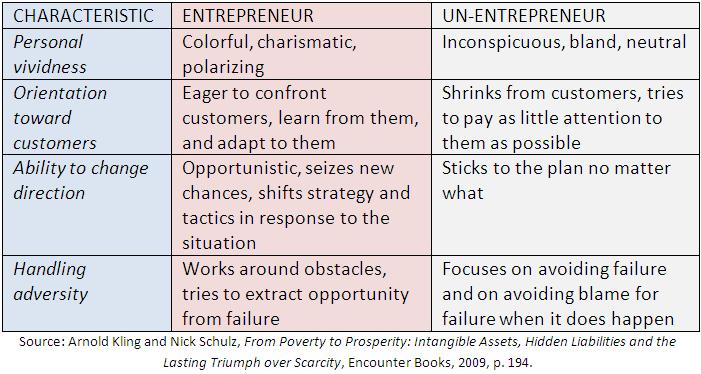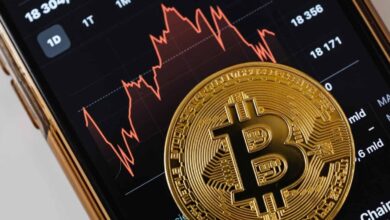Entrepreneur and Un-entrepreneur characteristics – Stephen Hicks, Ph.D.

I’m a fan of Arnold Kling and Nick Schulz’s From Poverty to Prosperity: Intangible Assets, Hidden Liabilities and the Lasting Triumph over Scarcity. I wrote about it here. It’s about Economics 2.0, as they call it, one key feature of which is putting the entrepreneur front and center — in contrast to much of traditional economics that marginalized or ignored the entrepreneur.
Kling and Schulz offer this table contrasting the characteristics of entrepreneurs and non-entrepreneurs (click to enlarge):
They follow up with a bite:
“If you look carefully at the right-hand column, you will notice something more than just the fact that these characteristics describe someone who is not well suited to being an entrepreneur. Someone who fits the description of an un-entrepreneur would be perfectly suited in another role — as a bureaucrat.”[1]
And more:
“A stereotypical bureaucrat, whether in a government agency or a large corporation, strives to remain inconspicuous and insulated from customers. Bureaucrats seem to prefer planning to action, and they become unhinged by adversity. They examine failure in order to pin blame and warn against recurrence, rather than to look for new opportunities.”[2]
Sounds right to me.
But a question about the traits: When we debate politics and economics, to what extent are we driven by such psychological dispositions, whether inborn or acquired?
That is, setting aside arguments based on economics, politics, and philosophy, how much of this psychology explains the difference between those with an entrepreneurial, free-market orientation — and those who thrive in cronyist corporations, those who advocate for “Third-Way” policies, and even those who desire centrally-planned political-economies?
Sources:
[1] Arnold Kling and Nick Schulz, From Poverty to Prosperity: Intangible Assets, Hidden Liabilities and the Lasting Triumph over Scarcity, Encounter Books, 2009, p. 194.
[2] Ibid., p. 195.
The book has been re-issued as Invisible Wealth: The Hidden Story of How Markets Work (2011).



